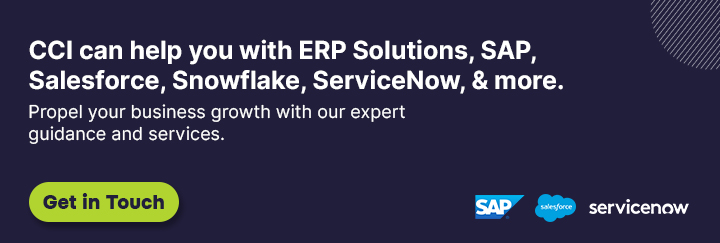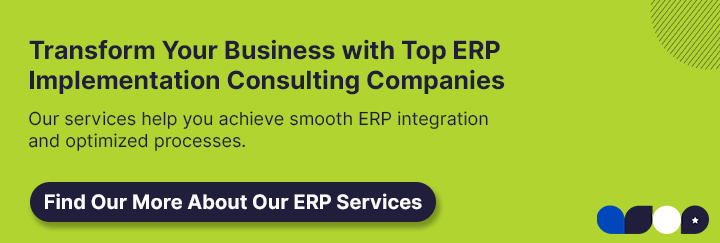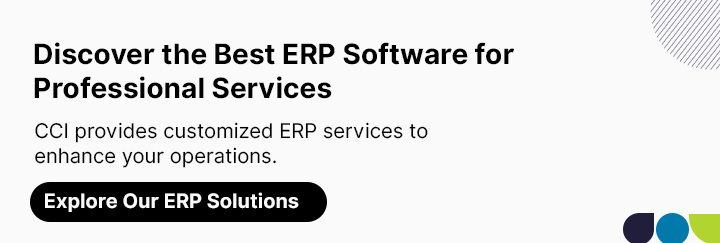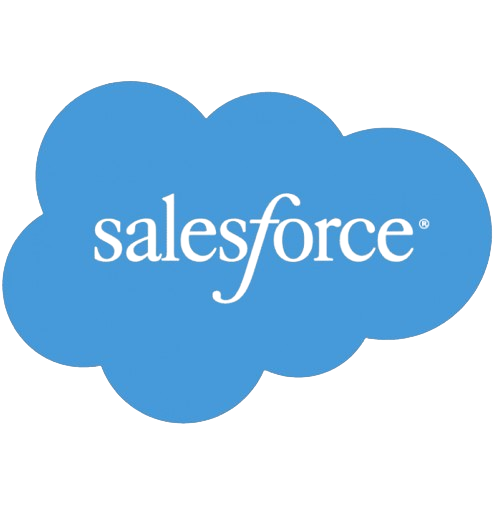Top ERP Systems with Advanced AI Features in 2025
Updated on February 9, 2026
In 2025, Artificial Intelligence (AI) is revolutionizing Enterprise Resource Planning (ERP) Systems, transforming them into intelligent platforms that drive efficiency, agility, and innovation. As businesses navigate an increasingly complex and data-driven landscape, ERP systems with advanced AI features are becoming essential for staying competitive. These systems leverage machine learning, predictive analytics, and conversational
AI to automate processes, deliver real-time insights, and enhance decision-making. This blog explores the top ERP systems leading the charge with AI ERP trends in 2025, highlighting their key features, strengths, and industry applications. Discover how these solutions can empower your organization to thrive in the AI-driven future.
>> Related Post: AI in ERP: Key Benefits and Implementation Types
The Role of AI in ERP Systems
AI is redefining ERP systems by embedding advanced technologies like machine learning (ML), natural language processing (NLP), and predictive analytics into core business processes. Unlike traditional ERP systems that relied on static workflows, AI-powered ERP platforms adapt to real-time data, automate complex tasks, and provide actionable insights. For example, AI can predict inventory shortages, optimize financial forecasting, or personalize customer interactions within CRM modules.
According to industry reports, AI-driven ERP systems can reduce operational costs by up to 20% and improve decision-making speed by 30%. As AI adoption accelerates, these systems are becoming critical for businesses seeking scalability, efficiency, and a competitive edge.
>> Related Post: Top 10 Emerging Trends of AI in ERP for 2025/2026
Top Artificial Intelligence ERP Systems in 2025
The following ERP systems stand out in 2025 for their sophisticated AI integrations, offering robust solutions for businesses across industries. Each system is evaluated based on its AI capabilities, scalability, and industry impact.
1. SAP S/4HANA
SAP S/4HANA is a leading ERP solution with its AI platform, SAP Business AI, and Joule, an AI copilot, driving intelligent automation and analytics. Built on an in-memory HANA database, it supports real-time data processing and scalability for large enterprises.
– Key AI Features:
Predictive Analytics: Leverages ML to forecast demand, optimize budgets, and reduce supply chain risks. For example, Walmart uses S/4HANA to process high-volume transactions in seconds.
Joule AI Copilot: Provides personalized insights, automates tasks like report generation, and enhances user interactions with NLP.
Industry-Specific AI: Trains models on company-specific data for tailored solutions in finance, logistics, and manufacturing.
– Strengths: Comprehensive AI integration, robust scalability, and strong compliance tools for global businesses.
– Challenges: High total cost of ownership (TCO) and a steep learning curve for smaller organizations.
– Best For: Large enterprises in retail, manufacturing, and finance needing advanced analytics and compliance.
2. Microsoft Dynamics 365
Microsoft Dynamics 365 integrates seamlessly with Office 365 and Azure AI, offering a cloud-based ERP suite with robust AI capabilities for businesses of all sizes.
– Key AI Features:
Dynamics 365 AI for Sales: Prioritizes leads and predicts customer behavior using ML-driven insights.
Supply Chain Management AI: Anticipates disruptions and automates inventory optimization, reducing stockouts by up to 15%.
Fraud Protection: Uses AI to detect anomalies in financial transactions, enhancing security.
Virtual Agents: NLP-powered chatbots support customer service and employee queries.
– Strengths: User-friendly interface, strong integration with Microsoft ecosystem.
– Challenges: Limited advanced features for highly specialized industries like aerospace.
– Best For: Mid-sized businesses and enterprises seeking a cost-effective, scalable ERP with strong AI integration.
3. Oracle Fusion Cloud ERP
Oracle Fusion Cloud ERP combines AI and IoT to deliver a versatile solution for industries like finance, healthcare, and telecommunications. Its cloud-native design ensures flexibility and scalability.
– Key AI Features:
Oracle AI Apps: Automate transactional processes like supplier recommendations and expense audits.
Generative AI Services: Include large language models for creating reports and personalized content.
Machine Learning Services: Enable custom model development for industry-specific needs, such as patient claims management in healthcare.
– Strengths: Strong integration capabilities, generative AI support, and suitability for complex enterprises.
– Challenges: Complex implementation and higher TCO for small businesses.
– Best For: Large organizations with robust IT infrastructure needing tailored AI solutions.
4. Epicor Kinetic
Epicor Kinetic is designed for manufacturing, retail, and distribution, with AI and ML integrations that enhance operational efficiency and user experience.
– Key AI Features:
Epicor Data Analytics: Provides ML-driven insights for production and inventory management.
Epicor Virtual Agent (EVA): An AI chatbot that automates tasks like quoting and scheduling using NLP.
Kinetic Design: AI-driven interface customization for role-based productivity.
– Strengths: Flexible cloud and on-premises options, user-friendly interface, and specialized manufacturing features.
– Challenges: Limited scalability for non-manufacturing industries.
– Best For: Mid-sized and large manufacturers seeking AI-enhanced production and analytics.
5. Acumatica Cloud ERP
Acumatica is a cloud-native ERP tailored for growing businesses, offering AI and IoT integrations at a competitive price point with a consumption-based licensing model.
– Key AI Features:
AI-Driven Insights: Automates accounting, sales, and customer management with real-time analytics.
IoT and AI Integration: Supports predictive maintenance and supply chain optimization for industries like manufacturing.
Role-Based Dashboards: AI tailors interfaces to user roles, improving productivity.
– Strengths: Affordable pricing, unlimited user access, and global adaptability.
– Challenges: May lack advanced features for large enterprises with complex needs.
– Best For: Small to mid-sized businesses seeking cost-effective, AI-enhanced ERP solutions.
>> Related Post: ERP Pricing 2025: Cost of ERP Software Implementation
Industry Applications of AI-Driven ERP
These systems are transforming industries by addressing specific challenges with the benefits of Artificial Intelligence in ERP:
- Retail: SAP S/4HANA and Microsoft Dynamics 365 optimize inventory and personalize customer experiences, reducing stockouts and boosting sales through predictive analytics.
- Manufacturing: Epicor Kinetic and Oracle Fusion Cloud ERP enable predictive maintenance and real-time production monitoring, minimizing downtime.
- Healthcare: Oracle Fusion Cloud ERP streamlines patient data management and resource allocation, ensuring compliance with HIPAA.
- Finance: SAP S/4HANA and Microsoft Dynamics 365 enhance fraud detection and compliance, automating audits and reducing risks.
ERP Professional Services Offered by Cloud Consulting Inc.
At Cloud Consulting Inc., we are dedicated to turning your business aspirations into reality through our comprehensive ERP services:
- ERP Professional Services
- ERP Consulting Services
- ERP Implementation Services
- ERP Software Development Services
- ERP Integration Services
>> Related Post: Agentforce vs. Einstein AI: Strengths, Weaknesses, and Use Cases
Conclusion
In 2025, ERP systems with advanced AI features like SAP S/4HANA, Microsoft Dynamics 365, Oracle Fusion Cloud ERP, Epicor Kinetic, and Acumatica Cloud ERP are redefining business operations. From predictive analytics to autonomous agents, these platforms drive efficiency, scalability, and innovation across industries like retail, manufacturing, healthcare, and finance.
By embracing these solutions, businesses can future-proof their operations, reduce costs, and gain a competitive edge. Partner with Cloud Consulting Inc. to leverage these cutting-edge ERP systems and unlock a smarter, more agile future for your organization.
FAQs
- How do AI-driven ERP systems improve cost efficiency?
AI automates tasks, optimizes resources, and predicts maintenance, potentially reducing costs depending on the industry. - Are these ERP systems suitable for small businesses?
Yes, systems like Acumatica and Microsoft Dynamics 365 offer affordable, scalable solutions with user-friendly AI features for small to mid-sized firms. - What is the implementation timeline for AI-driven ERP?
Timelines vary, typically 3-12 months, depending on complexity and customization needs. CCI provides tailored roadmaps to streamline deployment. - How do these systems ensure data security?
AI-driven threat detection and compliance tools align with regulations like GDPR and SOX, safeguarding sensitive data. - Can these ERP systems integrate with existing tools?
Yes, APIs and middleware like MuleSoft enable seamless integration with legacy systems and third-party tools.









